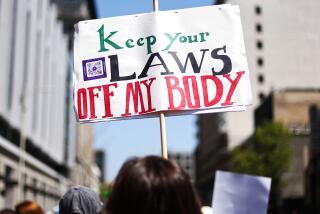PERSPECTIVE ON THE CONSTITUTION : Would Roe’s Demise Sink Privacy? : The modern American conception of freedom includes at least some inviolable sphere of private choice.
- Share via
It has become a commonplace of legal commentary and cocktail-party conversation that the days of Roe vs. Wade are numbered. The country waits through a sort of legal sitzkrieg for the Supreme Court to take up cases from lower courts considering challenges to Roe.
Rather than join the chorus of voices eager to bury or praise Roe vs. Wade, it may be more useful to speculate on the world of constitutional privacy if and when Roe is no longer part of it. In what condition will Roe’s principle--that certain personal choices are beyond the reach of government restriction, absent a compelling and narrowly tailored state purpose--survive the death of Roe’s result?
The doctrine that gave birth to Roe has its roots in decisions and commentary nearly a century old but did not fully come of age until Griswold vs. Connecticut (1964). Though the “right of privacy” is nowhere to be found in the Constitution’s text, the Supreme Court, in Griswold and afterward, found the right implicit in the First Amendment’s doctrine of free thought and association, the Third Amendment’s freedom from search and seizure, the Fifth Amendment’s self-incrimination clause, the Ninth Amendment’s grant of unenumerated rights to the people and, most important, the Fourteenth Amendment’s idea of personal liberty.
This march through the Bill of Rights, as one critic says, calls to mind a sort of constitutional cheerleading: “ ‘Give me a P . . . give me an R . . . an I . . .’--and so on,” until the court had patched together “P-R-I-V-A-C-Y as a derivative or penumbral right.” To others, however, so many specific freedoms are simply manifestations of the general concept of privacy, because it is the thread holding the fabric of individual freedom together. Or as Justice Louis D. Brandeis put it, privacy is the “right to be let alone--the most comprehensive of rights and the right most valued by civilized men.”
Since 1964, this unenumerated liberty has placed certain decisions considered by most to be personal or intimate largely beyond the reach of government. Laws forbidding or impeding the choice to use contraceptives, to marry one of another race, to live with extended family members and to view obscene movies within the home, all have been struck down as violations of the right to privacy--as were state laws criminalizing abortion in 1973. So if Roe is overruled, how will our right to make these other intimate choices fare?
Two characteristics of Roe and abortion make it unlikely that these other choices will be threatened. First, no other privacy issue--with the possible exception of “right to die” cases--steeps the court so deeply in factual and medical questions, and consequently demands such elaborate, detailed management. It was the court’s attempted mastery, through erection of the trimester structure, of ever-evolving scientific fact that prompted the noisy charges of “judicial lawmaking.”
Second and more important, there is no matter of individual privacy that so directly affects the interests of another party, whether that party is called “life” or “potential life.” Other currently protected marital decisions do not have as their consequence the termination of another interest, and have attracted far less attention. The Roe court recognized as much, calling the abortion decision “inherently different” from other private individual choices.
Still, it is hard to conceive of a decision more deeply personal than whether to bear a child. Can the court really protect, as constitutionally private, a mother’s educational choices for her child but not her decision to deliver that child?
At bottom, the most fundamental objection of Roe’s opponents applies equally to other privacy cases: The freedom to make intimate choices has no textual constitutional basis and must, therefore, be repudiated. Today’s invalidation of legislation on the ground of “liberty of personal decision” returns us, they claim, to the now despised era of the “Nine Old Men,” whose expansive and outdated economic constitutionalism blocked popular recovery measures during the Depression.
There are practical reasons, then, why Roe’s demise will have limited application to other protected realms of private life. But the judicial principle that will be used to reverse Roe cannot, with intellectual honesty, be limited to abortion. Indeed, those, like Robert Bork, who oppose Roe on jurisprudential and not mere policy grounds have always recognized as much and decried Griswold as well as Roe. The likely successor to Thurgood Marshall, Clarence Thomas, also had criticized the “invention” of constitutional privacy until hisconfirmation hearings, when he endorsed it.
If the court does overturn Roe, it would do well to recall the words of Oliver Wendell Holmes. It was his dissent in the infamous Lochner vs. New York that laid the groundwork for the eventual rejection of the court’s economic overreaching; it was also Holmes who cautioned courts against “err(ing) by sticking too closely to the words of a law where those words import a policy that goes beyond them.”
Holmes would understand that the lesson of Lochner and the executive-judicial showdown that followed in the 1930s is not just that “liberty,” economic or personal, must be somehow tied to language in the Constitution, but also that constitutional meaning is dynamic, not static. And that the Constitution has passed to a new generation of Americans whose conception of freedom includes at least some inviolable sphere of private choice.
More to Read
Get the L.A. Times Politics newsletter
Deeply reported insights into legislation, politics and policy from Sacramento, Washington and beyond. In your inbox twice per week.
You may occasionally receive promotional content from the Los Angeles Times.









